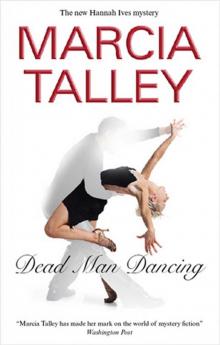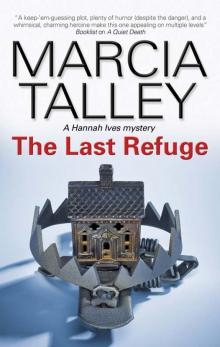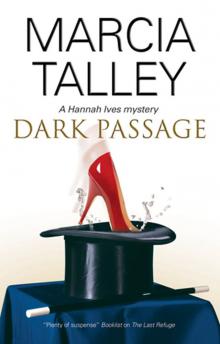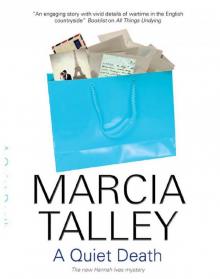- Home
- Marcia Talley
This Enemy Town
This Enemy Town Read online
Marcia Talley
This Enemy Town
A Hannah Ives Mystery
Dedication
“To the men and women who are faithfully serving in
enforced silence to secure for America the freedom
that is denied to them”
—Servicemembers Legal Defense Network,
Conduct Unbecoming
Epigraph
My birth-place hate I, and my love’s upon
This enemy town. I’ll enter: if he slay me,
He does fair justice; if he give me way,
I’ll do his country service.
WILLIAM SHAKESPEARE, CORIOLANUS, ACT IV, SC. IV
Contents
Cover
Title Page
Dedication
Epigraph
Chapter 1
Pay it back or pay it forward?
Chapter 2
Dorothy and I arranged to meet at Mahan Hall the…
Chapter 3
Seeing me at the musical rehearsal had apparently pegged Emma’s…
Chapter 4
Over the course of the next week I saw Emma…
Chapter 5
Victorian London: it surrounded me. Gentlemen in top hats. Ladies…
Chapter 6
As it turned out, it was a good thing I’d…
Chapter 7
I’d forgotten until we got there that Tuesday is Pub…
Chapter 8
At Tuesday’s rehearsal Dorothy pooh-poohed my concerns about Kevin, but…
Chapter 9
Two days before opening night, and panic set in. The…
Chapter 10
Nothing—not my husband’s embrace, nor a stiff shot of brandy,…
Chapter 11
Sweeney Todd was a smash, selling out from its first…
Chapter 12
It seemed as if my head had just hit the…
Chapter 13
“What time is it?” I asked Amanda Crisp as Agent…
Chapter 14
Baltimore, Maryland. My second hometown. Druid Park Zoo, the National…
Chapter 15
Sit tight. Easy for Paul to say. I’d been sitting…
Chapter 16
When Paul returned from his meeting, the seductive aroma of…
Chapter 17
The next day was Friday. While I waited for Paul…
Chapter 18
Paul is one of those professors former students go out…
Chapter 19
Late Saturday afternoon when Chris Donovan returned my call, I…
Chapter 20
I watched through the window as the back of Chris’s…
Chapter 21
By the time I got home, it was after eight.
Chapter 22
I have no way of knowing for sure, but I…
Chapter 23
I checked in with Dorothy every day after that. On…
Chapter 24
How we all fit into the private treatment room without…
Chapter 25
That night I lay in bed, numbly studying the shifting…
Chapter 26
Monday morning, early, I dressed in my recently acquired jogging…
Chapter 27
With Admiral Hart shipped off to Norfolk, Virginia, where the…
Acknowledgments
About the Author
Praise for
Other books by Hannah Ives Mysteries from Marcia Talley
Copyright
About the Publisher
CHAPTER 1
Pay it back or pay it forward?
That one’s easy. If I had to pay back every saint who left a fresh-baked loaf of bread or a hot casserole on my doorstep during the worst of my chemotherapy days, I’d be standing in the serving line at the Clay Street Helping Hand shelter, dishing up baked beans and mashed potatoes until the next coming of comet Kahoutec.
So I pay it forward, like in the movie. Out of the blue and for no reason, I do favors for strangers. And when they ask how to pay me back, I say they have to pay it forward. To three more people. Each.
When I first met Dorothy Hart at the Naval Academy Wives Club luncheon in January, I never dreamed that paying it forward would involve the use of power tools. Don’t get me wrong. I’m as much a handy-mom as the next woman on Prince George Street. You have to be when you live on Prince George, a three-block section of gorgeous, but chronically needy, eighteenth-century homes. My husband Paul signed us up for cable, in fact, so I could watch Talk2DIY on Home and Garden TV and House Doctor on BBC America. And, I was first on the block to raise my hand when Home Depot started offering Do-It-Herself home-improvement workshops.
When our upstairs toilet overflowed, ruining the living room ceiling, I turned DIY into a family affair, dragging my sister Ruth along to their session on plastering. She went grudgingly, lured out of Mother Earth, her New Age shop on Main Street, not by me, but by Home Depot’s catered veggie platters and dark, gooey brownies. Ruth needed the workshop, heaven knows, even though she probably planned on meditating away the plaster that rained on her head every time she opened her store’s storage room door.
In March, I’d be learning to lay brick. My neighbor, Brad Perry, the Corporate Lawyer, elaborately sidesteps the loose bricks on our front porch and warns me, congenially, that they’re a lawsuit waiting to happen.
So, I’m not opposed to power tools, per se. It’s just that there are hundreds of other ways I’d rather spend my time.
Paul gave me a nifty Barbara K Toolkit for my birthday. I use it occasionally, but store it in the basement, so if I’m up on the third floor with a nail between my lips, holding a picture against the wall, trying to decide where to hang it, I’m not going to be wild about laying everything down and trotting downstairs for a hammer. The heel of my shoe works just as well, thank you very much.
In the kitchen, I have a steak knife with a broken tip that doubles as a screwdriver (both Phillips and regular), and I can’t imagine how anyone manages without a good pair of chopsticks. When my grandson chucked my Timex down the toilet? Chopsticks. A hint for Heloise. I should send it in.
When I told Dorothy yes, I didn’t know about the power tools, of course. I had been grazing around the hors d’oeuvres table in the Midway Room of the Naval Academy Officers and Faculty Club—part of architect Ernest Flagg’s “New Academy” of 1899—sipping a glass of indifferent but deliciously cold Chablis, when Susan Fuquea, the petite, effervescent blonde married to the deputy commandant, introduced us. “Hannah, I’d like you to meet Dorothy Hart, Admiral Hart’s wife. They’ve just moved to Annapolis.”
Dorothy was a rail-thin brunette badly in need of a hair stylist. The bouffant “do” that bloomed from her head had gone out with Lady Bird Johnson. At least I hoped it had, but these days one can never be sure. If it’s really retro, it’s probably back.
I stuck out my free hand and tried to think who Admiral Hart was. The only admiral assigned to the Academy was its superintendent, and the superintendent’s name certainly wasn’t Hart. “Nice to meet you, Dorothy,” I said, and because in military circles wives are often defined—rightly or wrongly—in terms of their husbands, I quickly added, “My husband’s on the faculty here. Paul teaches math.”
Dorothy squeezed my hand, then dropped it to pluck a plump, chilled shrimp from a passing tray. “Ted’s stationed at the Pentagon,” she said, following my lead. “He’s Deputy Assistant Secretary of the Navy for Weapons Acquisition and Management. Or maybe it’s Under Secretary for Weapons Management and Acquisition.” She chuckled. “I don’t even think the Navy knows for sure.”
“The Pentagon?” I couldn’t imagine why anybody in his right mind would choose to live in
Annapolis and work at the Pentagon. The Pentagon is a grueling commute to northern Virginia and back, one hour or more in the best of traffic. Each way.
Susan Fuquea’s smile dazzled like an ad for Crest White Strips. “And Dorothy’s son, Kevin, is a second classman.”
Dorothy’s cheeks grew pink as she nervously tucked the empty toothpick she’d been holding into a fold of her napkin. “Kevin loves being here, so when Ted was offered his choice of Hawaii or the Pentagon, we didn’t think twice.”
“It must be nice to have your family together for a change,” I commented. “Where do you live?”
“We rented a condo near Reston for a while, but recently we bought a place in Davidsonville.”
I sipped my wine and nodded in approval. Davidsonville was near the intersection of 50 and 424, midway between Annapolis and Washington, D.C. Admiral and Mrs. Hart, I soon learned, had split the difference, and bought a ten acre lot in the heart of an area that had once been a prosperous horse farm.
Dorothy was describing how Homestead Gardens was transforming her flower beds into a bower of delight when Susan Fuquea waved a beautifully manicured hand to someone across the room. “Don’t mind me, ladies,” she said, turning in the newcomer’s direction. “Carry on. You two have a lot in common.”
A lot in common. I knew what that meant. I studied Dorothy’s pale, sunken features and felt my face grow hot. Her hairdo. That mushroom-shaped disaster I’d been so critical of a few minutes before was, I realized now, a wig.
I nibbled the dark chocolate off a strawberry while considering how best to bring up the C-word.
Dorothy saved me the trouble. Clearly Susan had filled her in on my medical history, and the introduction to Dorothy was no accident. She tugged on her bangs, sliding her wig to and fro over her scalp. “Chemo,” she said simply. “Three months to go. You?”
“Done!” I declared, instantly warming to a sister in arms. “Ages ago, thank goodness. I’ve been in remission for almost five years.”
“I hope you don’t mind,” Dorothy said, leaning toward me and speaking in an exaggerated whisper. “But I’d like to appoint you my new role model. You look terrific. It’s good to know that someday I might get my hair back.”
“Guaranteed,” I reassured her. “My hair grew back with a vengeance. It used to be straight, now look at it!” I spread my fingers and combed through the tight auburn curls that cascaded over my forehead. I decided not to mention my eyebrows, battalions of tiny hairs that had gone permanently AWOL. Each morning I fill in the blanks, brushing on eyebrows from a box labeled “Shaping Taupe.” “Where are you going for treatment?” I inquired.
“Hopkins,” she said.
“Ah. Another good reason for choosing the Pentagon over Hawaii.”
Although the medical care in Annapolis is first rate—Paul theorizes that doctors like to set up practice near their sailboats—we’re just thirty miles from Baltimore and Washington, D.C., and if you need them, the best hospitals that Philadelphia and New York City have to offer are only a few hours north by train.
“After the mastectomy, my follow-up treatment was definitely a prime consideration,” Dorothy continued. “And then there’s Kevin, of course.”
I didn’t know Midshipman Hart, but I wondered how gung-ho the young man would be about a mother hanging over his shoulder. My own daughter, Emily, had attended Bryn Mawr College in Pennsylvania—two hours flat from our doorstep to hers. She’d been a capable student, but a difficult and headstrong young woman. Back then, two hours had been about right: it kept us from killing one another. But now …?
“Do you have children, Hannah?” Dorothy asked as if reading my mind.
“A daughter,” I replied.
Dorothy had acquired a glass of wine from a passing server and I watched as she sipped at it, cautiously at first—as if testing the bouquet—then more thirstily.
“Emily lives in Virginia, near Staunton. Her husband works at a chi-chi health spa up in the mountains.” I took a rejuvenating swig of my own wine and thought how much I envied Dorothy having her son so close by. Staunton—and my two adorable grandchildren, Chloe and Jake, were more than three hours away.
Dorothy asked a few polite questions about my son-in-law, Dante, and the health spa he worked in, but she looked so washed out and worn that I actually considered calling up Dante and ordering an emergency full-body massage for the woman. Compliments of moi.
Then I did the next best thing. I set my wineglass down on a cloth-covered serving tray, smiled reassuringly at Dorothy, took a deep breath and paid it forward. “Is there anything I can do to help? Anything at all?”
Dorothy paused, nibbled on a miniature totem pole of cheese, olive, and salami and considered. “Actually, there is.”
I snagged a shrimp for myself and waited for her to continue.
“Kevin’s landed a role in the Glee Club musical,” she told me, “and in some insane moment, I agreed to help out. But, I’m just exhausted, Hannah. Some days I can barely put one foot in front of the other.” Her eyes went wide and shone with desperation. “But I hate to disappoint Kevin.”
I nodded. The Glee Club is the Naval Academy’s premier musical organization. Every February they take time from their busy academic schedule to produce a Broadway musical that’s so good it routinely outdraws all the amateur theaters in the Baltimore/Washington area. Combined. Paul and I never miss a show. The year before they’d staged a spellbinding version of Fiddler on the Roof. Everyone was still raving about it.
And the competition is stiff. Kevin would have had to beat out dozens of other singers for a role—any role—in the show.
“What are they doing?” I asked.
“Sweeney Todd.”
I was working on a second shrimp, and I swallowed it then, practically whole, in my haste to respond. “Oh my God!” I croaked. “I love Sweeney Todd! When the DVD with Angela Lansbury finally came out, I ran straight out to Tower and snatched one up. I must have played it a hundred times already.”
“It is wonderful,” Dorothy agreed. “Kevin’s excited about being given the opportunity.”
“What role’s he playing?”
“Jonas Fogg,” she said, “the guy who runs the insane asylum. It’s not a huge part, but Kevin’s a fine tenor, so they use him in all the company numbers. And he’s understudying the role of Beadle Bamford, so there’s always the possibility …” Her voice trailed off and she blushed, as if embarrassed about where that thought was taking her.
“I’m surprised I haven’t seen the posters yet,” I commented. “Sweeney Todd is a mega hit. It should really pack them in.”
“Who’s Sweeney Todd?” someone warbled from the direction of the crab dip. I turned to face one of my least favorite people, Margaret Atkins, wife of the chairman of the math department, aiming an overloaded slice of melba toast directly at her mouth. Even though Paul had been completely cleared of sexual harassment charges brought against him several years before by a former student, Margaret still regarded him, and me, with deep suspicion.
“Dorothy Hart, meet Margaret Atkins, who, clearly, has spent the last two decades living under a rock.” I said it with a smile so Margaret would know I was teasing, but she took my remark the wrong way, as usual.
“I still work, Hannah,” she snorted, pointedly reminding me that since I’d been riffed from my job in Washington, D.C., I didn’t. “I had to take a day off to come to this luncheon.”
Out of the corner of my eye I caught Dorothy in mid-gape, so I knew I wasn’t the only person in the room who found the woman’s behavior boorish. Margaret was round and stumpy, stuffed like a sausage into a tailored two-piece suit of the same improbable red as her hair. She was also the pain-in-the-ass manager of the Academy branch of the Naval Federal Credit Union, so I had to deal with her on occasion, like it or not.
It was an effort, but I decided not to walk down any mean streets with the woman. “It’s about a barber named Sweeney Todd who was unjustly exiled to
Australia,” I explained with exaggerated sweetness. “He escapes back to London where he goes into business over Mrs. Lovett’s pie shop—”
“The worst pies in London,” Dorothy chimed in.
“Exactly. And the two of them plot revenge against the lecherous judge who framed Sweeney and raped his young wife.”
Margaret took a step back, one hand pressed flat against her bosom. “Oh, yuck!”
“Sweeney uses his razors to knock off his customers,” Dorothy added, leaning toward Margaret and emphasizing every word, “by slitting their throats.”
The hand bearing the melba toast began to waver. A glob of crab dip slid sideways onto the floor.
“But Mrs. Lovett’s pretty darn resourceful.” Dorothy threw me an exaggerated wink, clearly enjoying herself at Margaret’s expense. “Pretty soon all of London’s lining up for a taste of her delectable meat pies.”
“‘Shepherd’s pie peppered with actual shepherd …’” I sang softly.
Dorothy smiled mischievously, then toasted Margaret with her empty wineglass. “Think about that the next time you stick your fork into a meatball, Margaret.”
I laughed out loud. I couldn’t help it. I’d swallowed a good bit of wine on a nearly empty stomach, after all, which probably upped my silliness quotient by fifteen or twenty percent.
Margaret gasped, then looked down, staring with embarrassment at the creamy, cheesey glob on the rug next to the toe of her patent leather pump. She waved down a passing server. “Somebody’s dropped some crab dip,” she informed the young woman. “It needs wiping up.”
I caught Dorothy’s eye. Somebody? she mouthed.

 Unbreathed Memories
Unbreathed Memories Tangled Roots
Tangled Roots Dead Man Dancing
Dead Man Dancing Without a Grave
Without a Grave Sing It to Her Bones
Sing It to Her Bones All Things Undying
All Things Undying Naked Came the Phoenix
Naked Came the Phoenix Daughter of Ashes
Daughter of Ashes Footprints to Murder
Footprints to Murder The Last Refuge
The Last Refuge Mile High Murder
Mile High Murder Dark Passage
Dark Passage This Enemy Town
This Enemy Town Tomorrow's Vengeance
Tomorrow's Vengeance Occasion of Revenge
Occasion of Revenge I'd Kill For That
I'd Kill For That A Quiet Death
A Quiet Death